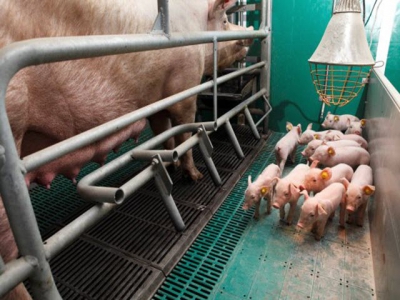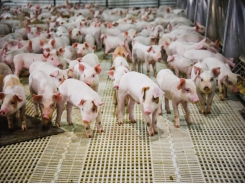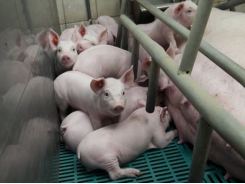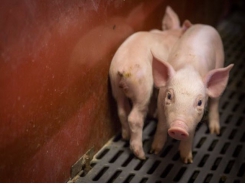Different types of oil in sow diets: Effect on milk

Milk fat is an important component in sow milk, as this helps to boost survival rates for the newborn piglets. Chinese researchers compared different types of oil in sow diets and the effect of milk parameters.
Photo: Hans Prinsen
This was concluded by researchers from the Institute of Animal Nutrition, Northeast Agricultural University in China who studied the effects of adding different sources of fat to diets for sows on the performance, milk fatty acid (FA) profiles, fat globule size of milk, and immunoglobulins of sows and piglets during late gestation and lactation. The incentive for this study comes from the fact that milk fat is an important component of sow milk and is also an important quality indicator in milk assessment. Earlier studies showed that the addition of fat to sow diets have improved the survival of piglets and increased the weaning weight of piglets.
Different oils tested
Soybean oil is the most commonly used feed resource and is rich in C18:1 and C18:2. Therefore the aim of the present study is to evaluate the effects of supplementation of coconut oil, palm oil, soybean oil and mixed oil in diets of sows on performance milk FA profiles fat globule size of milk and immunoglobulins of sows and piglet during late gestation and lactation. In the study 60 sows were randomly allotted to four dietary treatments supplemented with 3% soybean oil, 3% coconut oil, 3% palm oil or 3% mixed oil, which included 1% soybean oil, 1% coconut oil and 1% palm oil, respectively, from day 107 of gestation to day 21 of lactation.
The coconut oil contained lauric acid (C12); the palm oil contained palmitic acid (C16); and the soybean oil contained linoleic acid (C18). The results showed that supplementation of coconut oil, palm oil, soybean oil and mixed oil in sow had no effects on sow and litter performance (P > 0.05). The addition of soybean oil to the diet increased the fat concentrations in colostrum compared with diets supplemented with palm oil and coconut oil (P < 0.05). No differences between treatments were observed among the immunological variables of the colostrum and milk (P > 0.05). However, the IgG and IgA levels increased in the plasma of sows and day 21 piglets after supplementation with soybean oil compared with diets supplemented with coconut oil and palm oil (P < 0.05).
Effect of supplementation of fat sources during late gestation and lactation on sow and piglet performance

Supplementation with coconut oil decreased the IgG and IgA concentrations in the plasma of sows compared with those of other groups (P < 0.05). When coconut oil was included in the sow diet, increased concentrations of C12:0 and C14:0 were found. The addition of palm oil to the sow diet increased the content of C16:0 in the colostrum and milk (P < 0.05). Increases in the concentrations of C18:2n-6 and C18:3n-3 were more pronounced in the colostrum and milk from sows fed soybean oil than in the colostrum and milk from sows fed other dietary treatments. The pattern of FA in plasma of piglets was similar to that in the sows’ milk. Additionally, the sow diet containing soybean oil led to an increased fat globule size, whereas coconut oil and palm oil decreased the fat globule size (P < 0.05). In conclusion, supplementation of soybean oil increased the colostrum fat and C18:2n-6 and C18:3n-3 concentrations as well as enhanced the immunoglobulin levels in the plasma of sows and piglets compared with the effects of supplementation with coconut oil and palm oil.
Conclusion
In conclusion, including soybean oil, coconut oil, palm oil and mixed oil in the sow diet during late gestation and lactation had no effects on the sow or litter performance, the percentages of protein, lactose, and total solids in colostrum and milk. Supplementation with soybean oil increased colostrum fat and C18:2n-6 and C18:3n-3 concentrations and enhanced immunoglobulin plasma levels in sows and piglets compared with those of sows fed diets supplemented with coconut oil and palm oil. The addition of coconut oil to the sow diet decreased MFG sizes. Similarly, the additions of palm oil and soybean oil decreased MFG sizes, but to increasingly lesser degrees, i.e., as the FA chain length increased, the sizes of MFG increased in sow milk.
Related news
Tools

Phối trộn thức ăn chăn nuôi

Pha dung dịch thủy canh

Định mức cho tôm ăn

Phối trộn phân bón NPK

Xác định tỷ lệ tôm sống

Chuyển đổi đơn vị phân bón

Xác định công suất sục khí

Chuyển đổi đơn vị tôm

Tính diện tích nhà kính

Tính thể tích ao




 How to start the piglet off well –…
How to start the piglet off well –…  Key issues in designing feed for antibiotic-free pork
Key issues in designing feed for antibiotic-free pork